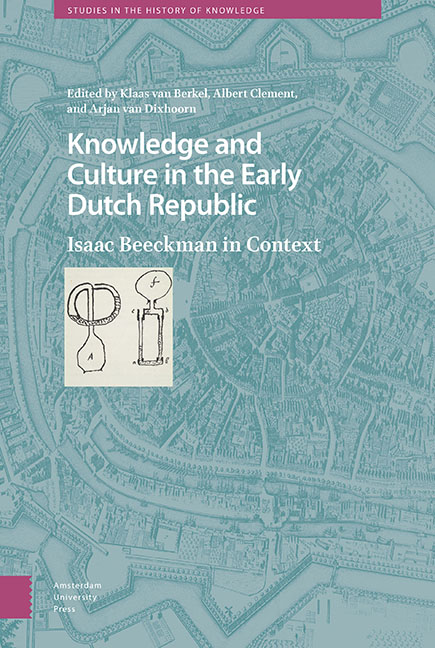18 - Concluding Remarks
Published online by Cambridge University Press: 07 October 2022
Summary
The study of Isaac Beeckman's mechanical philosophy began in the early twentieth century in the margins of the study of Descartes and Mersenne. It also began in the context of the early professionalization of the history of science. Beeckman's editor, Cornelis de Waard, after all belonged to the first generation of specialized historians of science. In the second half of the twentieth century the study of Beeckman's work was emancipated from the study of Descartes. Beeckman emerged as a pioneering contributor to the new mechanical philosophy in his own right, and this volume shows that the study of his ideas about nature is by no means exhausted. Yet, in the context of the social history of science and the newer history of knowledge, in the late twentieth and early twenty-first century Beeckman has gained more significance as a crucial witness not only to revolutionary developments in natural philosophy. His Loci communes have also become testimony for the ‘otherness’ of the local, regional, and trans-European knowledge cultures that preceded the new science that emerged with Descartes and Newton. His lack of interest in communicating his work in print has long had a marginalizing effect on the role awarded to him in the shaping of the new science, that is, in the lineage from the well-published Descartes to Newton. Ironically, it is precisely because of his manuscript book that Beeckman is emerging as an interesting case in the new history of knowledge. The Loci provide great material for those interested in ‘knowledge-in-the-making’ rather than ‘ready-made-knowledge’, to quote Bruno Latour. They bristle with notes that allow us to peak into knowledge-making practices, the evolution of rules for such practices, and the interactions of a wide range of ‘knowledge-makers’ that often remain invisible or difficult to trace. Several contributions to this volume show how the Beeckman studies can be expanded beyond the big questions related to the rise of the new science, using those notes. Building upon those contributions, Beeckman's Loci can become crucial evidence in writing cultural and social histories of the world before the new science emerged.
Of course, the study of these wider cultures of knowledge through Beeckman's testimony should not divert from the study of the man, his work and his legacy, which is also far from exhausted.
- Type
- Chapter
- Information
- Knowledge and Culture in the Early Dutch RepublicIsaac Beeckman in Context, pp. 471 - 476Publisher: Amsterdam University PressPrint publication year: 2022

